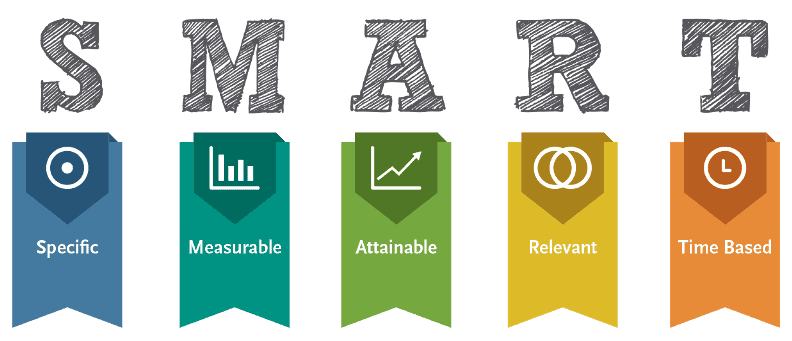Weight Loss Goals: Realistic or Unreasonable?
Setting weight loss goals is at the heart of successful weight loss.
If you are determined to lose weight, you might think that your first steps should include things like going grocery shopping for healthy foods and joining a gym.
These steps are obviously necessary, but one thing that you will probably want to focus on in the beginning is setting weight loss goals. Personal goal setting with realistic weight loss goals can help you get started off on the right foot with your weight loss journey.
“If you want to get fit and stay fit, the fitness goals you set need to be attainable; something that you can stick to for months and years to come. It’s a process and a very long one. Yes you can switch things up to make it fun and different, but unless it’s your job, do not train insane because unfortunately, you will quit before you see any results.” states Marshalee McIntosh-Jin, a Clinical Researcher and a Wellness, Fitness & Beauty Blogger.
What is Goal Setting?
If you’re still confused and are asking yourself, “What is goal setting?” you should know that it’s not something that you should be intimidated by. As the name suggests, it just applies to setting goals for yourself.
Goal setting is important with many things, including weight loss. With goal setting, you will determine how much weight you want to lose and by when.
Many people find that breaking up their goals into smaller ones — such as losing five or 10 pounds at a time — is a lot easier than focusing on their end goal, which could add up to be a significant amount of weight.
Different things work for different people, so you may even find that you have to tweak your strategy later on to something that works better for you. Let’s start off with seven things you need to remember about weight loss goals.
“Weight loss doesn’t happen overnight, or even in a few weeks. I hate using the word diet and when you take away everything and aren’t realistic you tend to go backwards and not forward. Properly losing weight is not a diet, think of it more as a lifestyle change for the better. By changing little things and not beating yourself up mentally you will start to feel healthier, have more energy and be a happier person. Just like Pilates, changing your lifestyle is about progression not perfection. So breathe, be patient and remember to move more, eat food that makes you feel good and be nice to yourself!” states Chelsea Streifeneder, Owner of Body Be Well Pilates.
Sticking with those goals once set can be a hard process. The weight-loss app Noom, offers expert support, human coaching, and an active virtual support community.
Realistic Weight Loss Goals
The first thing that you should know when taking goal setting steps is that it’s essential to set realistic goals for weight loss. Some people just aren’t practical when it comes to losing weight.
The truth is that it’s hard and that it can be time-consuming. You want to strive for healthy weight loss goals, not losing as much weight as possible in a ridiculously short period.
Therefore, when you are thinking about how much weight you want to lose and how much time you are going to give yourself to reach these goals, you’ll want to focus on reasonable weight loss goals in a reasonable time frame.
Attempting to lose 50 pounds in one month just isn’t realistic, but aiming to lose a pound or two per week is.
Reasonable Weight Loss Goals
Along with making sure that you are giving yourself enough time to achieve your goals, you’ll also want to make sure that you are reasonable about the amount of weight that you want to lose.
One big part of smart goal setting is ensuring that the weight that you want to get down to is a healthy weight for your height and build.
You can use a BMI calculator or a weight chart to give you a good idea of how much you should weigh, or you can talk to your doctor.
Use this information to set your goals at reasonable levels so that you don’t set out to lose more weight than you need to lose.
“If you are starting out overweight/obese, setting a goal to lose 5% of your baseline body weight can result in meaningful reductions in cardiovascular risk factors.” states Debbie Fetter, PHD Candidate, an American Society for Nutrition contributor.
Setting Weight Loss Goals
Setting weight loss goals is not as complicated as it might seem. You also don’t have to make a commitment to anyone else if you don’t want to.
In fact, you do not even have to share your weight loss goals with anyone else, although some people find that it’s motivational to do so.
Instead, you can write them down on a piece of paper, log weight loss goals on your computer or just keep them in your mind as you work to achieve them.
There is no right way or wrong way to go about setting your goals as long as you are focused on setting them and then striving toward them.
Everyone goes through tough times when it seems like goals are unattainable. The truth of the matter is we all need support and that’s exactly what the weight-loss app Noom offers.
Goals for Weight Loss
Lots of people set goals for weight loss, even though they might all be different. You can also set accompanying goals that go along with your weight loss.
For example, you might want to shoot to lose 20 pounds, but you may also have specific fitness goals in mind.
Alternatively, you may want to shoot to stop drinking soda or only to eat clean, non-processed foods. These types of goals can help you lose the weight that you want to lose and can help you feel better overall as well.
Healthy Weight Loss Goals
The primary thing that you are going to want to focus on when setting your goals is making sure that they are healthy.
It is not healthy to try to lose too much weight too quickly, for example, and it also isn’t healthy to try to get down to a weight that is below the ideal weight for your height and build.
There are a ton of resources out there that can help you focus on setting healthy weight loss goals that will benefit you greatly in the long run.
Smart Goal Setting
Focusing on setting smart goals is important. You shouldn’t just rush to set your goals. Instead, you should take the time to do plenty of research and to look inward so that you can determine what you want to achieve.
“Eating healthy doesn’t need to be a chore or something that is scheduled. Once you incorporate whole foods into your daily meals, you’ll feel the profound difference in your body, mind, energy level and disposition.” states Robyn Gleason, owner of Simply Fresh Dinners.
This can help you set goals that will benefit you in the long run, and that will provide you with the most personal satisfaction when you reach them.
Once you’ve set those goals you need to stick with them. Tracking your food and exercise is one step, but the weight-loss app Noom offers much more. All users get human, one-on-one coaching because success is the only option.
Importance of Goal Setting
Why is goal setting important? You should think about how hard it is to lose weight and about how easy it is to get frustrated when you don’t feel as if you see the results that you want to see.
By setting goals, you can help prevent yourself from being frustrated, since you’ll be able to chip away at your weight loss one pound at a time.
This can make the whole process of sticking to a healthy diet and exercise plan a whole lot easier, which can help you stay on track and help you achieve better results in the long run.
Why is Goal Setting Important?
The importance of goal setting goes beyond just avoiding getting frustrated, although this element is essential. By making a plan about how much weight you want to lose, you can help ensure that you are targeting a healthy and realistic weight for yourself.
This can help to prevent you from attempting to lose too much weight as well. Plus, once you start having goals in mind, it can be easier for you to make a plan that will work and help you get the results that you are looking for.
Goal Setting Steps
The steps to setting goals for losing weight are pretty easy.
- Weigh yourself so that you know what your starting point is
- Research to determine how much you should weigh at your height
The first goal that you might want to set might be to get out of the “obese” or “overweight” range. Then, you can focus on other goals, such as losing another 10 pounds so that you can feel confident about how you look.
Along with setting your goals, you’ll need to follow certain steps when achieving them as well. You may find that you want to track them and check them off of your list as you meet them, for example.
You might even decide that you will reward yourself in some way, such as by buying a new outfit when you reach your first weight loss goal and a new wardrobe when you achieve your final weight loss goal.
Rewarding yourself is a good way to pat yourself on the back for all of your hard work, and knowing that you have a reward coming can also help you stay focused on achieving the goals that you have set for yourself. According to the NIH, thinking long-term and taking it slow it important.
Take the weight-loss app Noom along for the ride and get access to human coaching, one-on-one support, and a community that’s there to help if times get tough. Sticking with your goals just got easier.
What Users Are Saying
“Make goals that don’t involve weight! Some of mine are walking 10,000 steps a day (checked at least 5/7 days lol), bend over and touch my toes, be able to drop it like it’s hot and get back up, and fit on the Harry Potter Rides at Universal!”
“In my experience, and from the experiences I’ve read from others, putting a time frame on this makes it unnecessarily stressful. If you slip up you just start thinking “oh fuck how long is this going to set me back?” That’s especially a bad thing if you’re a stress eater. You’re basically stressing yourself out for no good reason, and that may cause a snowball effect where you rely on food even more. I actually recommend short term goals. Don’t worry about the long term, because the long term falls in place when you do the short term correctly. Many people look at weight loss as climbing a huge mountain. You just see a mountain of weight loss in front of you. It can be demotivating to say the least. Instead of worrying about that huge mountain, focus on the short term. Make a goal to meet your calorie goal to the best of your ability, every day. A year from now you’re going to have huge progress to show off, and that time will pass no matter what. You just need to keep yourself on track. Smaller, intermediate goals helps with that.”
“I like to set small pound goal increments vs. a big picture loss. My ultimate goal is around 125lbs, but at 143.6lbs rn my goal is 140-141lbs since being closer to a ‘normal’ weight for my height means slower loss. When I reach that my new goal will be 136, and so forth. I feel it keeps me personally happier because I’m reaching new lows that I’ve never seen, and hitting my ultimate is a bonus that could happen someday.”
Personal Goal Setting
Once you start setting goals for losing weight and see how much goal setting helps you, you may find that you want to start setting goals in other areas of your life as well.
These can include many things. You might set goals to increase your education or to improve and build your career or business, for example.
Goal setting isn’t just beneficial in regards to weight loss; it can also help you out in many areas of your life and could be just what you need to do so you can truly work toward doing all of the things you want to do.
According to the Journal of Human Nutrition and Kinetics, setting goals can lead to more success with weight loss goals.
Weight Loss Goals: Realistic or Unreasonable? Questions & Answers
- Recent:
A realistic weight loss goal per month is 1-2 pounds. This rate of weight loss can be achieved through a combination of healthy eating and regular physical activity.

Julia Steier, C.P.T., F.N.S, is a former NCAA Division I athlete and has been working in NCAA intercollegiate athletics for 10 years. Inspiring student-athletes to dream big and push themselves through training, Julia has coached many athletes over the years to becoming Regional and National All-Americans. Julia has lost over 65lbs and is living her best life now. She used fitness to deal with the grief of losing her husband, which has become her passion for motivating, inspiring and encouraging those around her to work towards finding the best versions of themselves through a healthy lifestyle. Julia is featured in Runners World, Women’s Health and more.



